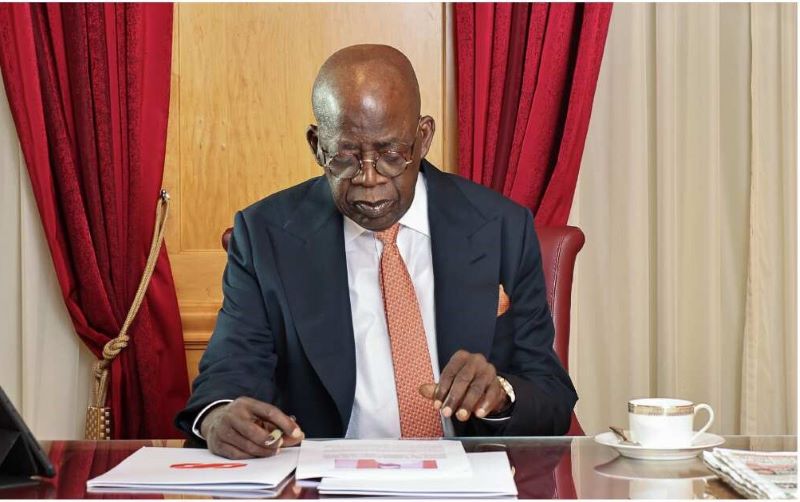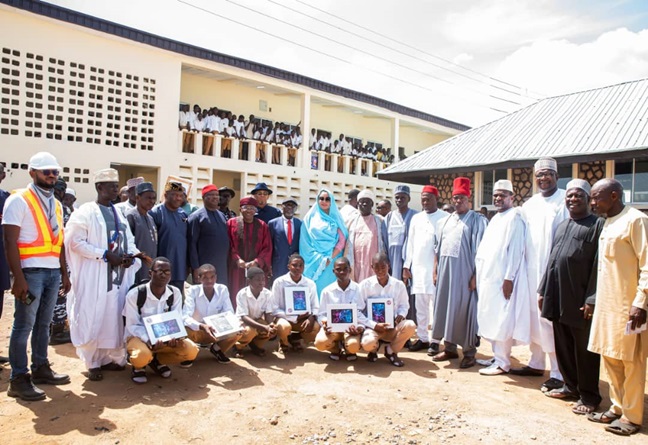Legislature
Senate alters plenary time, indicts self over disregard for its standing rule

***As Lawan disagrees with Akpabio over alignment with Reps
The 10th Senate on Thursday acknowledged its greatest shortcoming of Commencing plenary behind schedule thereby trampling on its standing rule that stipulated 10am as the time for commencement of sitting.
The Senate Leader Opeyemi Bamidele had raised two motions at the commencement of plenary, on one hand he proposed amendments to the standing rules in respect to amendment of order 8(2) which has to do with sitting of the Senate as it is proposed on Tuesdays, Wednesdays and Thursdays for the Senate to shift it from 10am to 11am
The leader also moved his second motion on Standing Committees
Amendment of order 96 inclusion of 58 which is to create the Senate Committee on Reparation and repatriation.
However, the second motion was stepped down as senators opted to debate on the issue of sitting time.
While lending his voice to the issue Senator Akpabio had indicated that the most urgent motion is to align the time of resumption with what obtains in the House of Represntatives.
He suggested that the motion should be separated and that the first one to be taken should be the time of sitting.
Immediate past President of the Senate, Ahmed Lawan while making his contribution disagreed with Akpabio saying, “I don’t know the basis at the moment for which we want to shift our sitting from 10 to 11 and end at 3pm, for me, we have more energy, our eyes are clearer in the morning and one hour into the day, probably we would have lost some energy.
“If we work between 10am and 2pm, if we seat in the plenary between 10am and 2pm, our committees would do better. If we don’t have any reason except we have to synchronize with the house, I think we need to look at it again. But if we have other reasons that we must change that is fine. If it is just to synchronize the House may have their reasons for sitting at 11 and close by 3 but here I don’t see the reasons.
Responding Akpabio threw it back at Lawan that the idea of the Senate sitting by 11am started during his time as the Presidwnt of the 9th Senate especially during the period of the covid.
Explaining further, Lawan said it was as a result of the dreadful COVID-19 the time was tinkered with from 10am to 11am adding that they had to cut down on the number of days for plenary.
Akpabio retorted saying, “Our rules said 10am but we came to meet the tradition of 11am, the only thing that we changed was to add additional day because during that COVID-19 period we were sitting twice a week.
“I said no, since there is no more COVID we should sit three times in a week and we maintained what we saw, 11am but now we are.saying that we have not been able to justify the 11am sitting unless it reflects same on our rules.
“The Idea of 3pm in my view is not correct because it does not mean you must sit till 3pm. It simply means if we don’t have musc to do we can Close at 1pm or 2pm to enable our colleagues to go for committee sittings and other matters related to the proceedings of the Senate such as clearances and all that.
“The only aspect of it is to legalise it so that people dint have the impression that you are sitting at 11am while the rule says 10am.
The Senate Leader again said,
“I want to make a very passionate appeal to our colleagues, for me I believe the issue should go beyond trying to reconcile with the house of representatives, the logic is that a lot of times, distinguished senators have reasons to go to bed late and there is no point having in our rule book that our sitting time is 10 am, and everyday we sit at 11’o clock.
“Of course there are some distinguished senators who would be here 10 for 10 but there have been a lot of time where even you Mr. President at 11or 10:30 and we have to wait for some of our collegaues to come so that we could form a qorum , it is important that we work our talk.
“If our rule had said 10 am and we have not been able to seat 10am for 10am, I think what is most important is that if we say 11am, it should be 11’oclock.
“I think it makes sense that we amend our rules to read 11’o clock rather our rule book saying 10 am and we don’t seat until 11, for me this is the basic justification.
After going into into close session at the instance of Akpabio so that members of the public will not misunderstand them they return to support the motion which stipulates that plenary session will now commence at 11am.
Before now, according to the Senate Standing Rule, plenary starts at 10 a.m. on every legislative day.
Rule 8 (2) of the Senate Standing Rule (as amended) states: “On Tuesdays, Wednesdays and Thursdays, the Senate shall meet at 10:00 a.m. and unless previously adjourned shall sit until 2:00 p.m., unless before a substantive motion had been moved by the Leader of the Senate or a Senator acting in that capacity “that this Senate do now adjourn” and if such a motion be moved and if the question thereon has not previously been determined, at 2:00 p.m. the President of the Senate shall adjourn the Senate without question being put.”
However, because the senate president who presides over the sitting was in the habit of arriving late, the plenary had always begun much later. As a result of the tardiness, many Senate committees have had to postpone important meetings because the Senate plenary ended late in the evening.
Legislature
NASS modifies NDLEA Act, Prescribes Life Imprisonment for Drug Traffickers

The National Assembly has modified the National Drug Law Enforcement Agency (NDLEA) Act to prescribe life imprisonment for individuals found guilty of storing, transporting, or concealing illicit drugs and substances.
The amendment was adopted on Thursday during plenary, presided over by Deputy Senate President Barau Jibrin, following broad support from the senators.
The amendment reflects a harmonised position of the Senate and the House of Representatives on Section 11 of the NDLEA Act.
The House had earlier passed an amendment prescribing life imprisonment for drug traffickers, while the Senate had proposed the death penalty.
To reconcile the differences, a conference committee of both chambers was convened. Senator Tahir Monguno, Chairman of the Senate Committee on Judiciary, Human Rights, and Legal Matters, presented the harmonised version to the Senate.
He urged lawmakers to adopt the House’s position of life imprisonment, arguing that enforcing the death penalty could lead to the execution of over 900 accused persons currently awaiting trial for drug-related offenses.
The Deputy Senate President who presided over the plenary had put the resolution to a voice vote, and the majority of senators supported the amendment.
The approved version stipulates life imprisonment for offenders.
The amended section now reads:
“Anybody who is unlawfully involved in the storage, custody, movement, carriage, or concealment of dangerous drugs or controlled substances and who, while so involved, is armed with any offensive weapon or is disguised in any way, shall be guilty of an offence under this Act and liable on conviction to be sentenced to life imprisonment.”
This amendment aims to strengthen the fight against drug trafficking while addressing concerns over human rights and the judicial implications of the death penalty.
The move is part of efforts to curb the growing menace of drug trafficking and its adverse effects on Nigerian society. According to Senator Monguno, the life imprisonment penalty strikes a balance between deterrence and humane judicial practice.
With the amendment, the NDLEA now has a robust legal framework to prosecute offenders and combat drug-related crimes effectively.
Legislature
President Tinubu urges Senate to approve ₦1.767trn External Loan

President Bola Ahmed Tinubu has formally requested the National Assembly’s approval for a $2.209 billion (₦1.767 trillion) external borrowing plan to finance part of the ₦9.17 trillion fiscal deficit in the 2024 budget. The loan, included in the 2024 Appropriation Act, is critical to the government’s broader strategy for economic recovery and growth.
In a letter to Senate President Godswill Akpabio, President Tinubu noted that the borrowing aligns with the provisions of Sections 21(1) and 27(1) of the Debt Management Office (DMO) Establishment Act, 2003. He also indicated that the Federal Executive Council (FEC) had approved the plan.
The President explained that the funds would be sourced through Eurobonds or similar external financial instruments. A detailed summary of the loan’s terms and conditions accompanied the letter to guide legislative scrutiny.
“This borrowing is necessary to address the budget deficit and fulfill our fiscal strategy for 2024. Swift approval will enable us to move forward with mobilizing these funds,” the President stated, emphasizing the urgency of the request.
Senate President Akpabio referred the matter to the Committee on Local and Foreign Deb
Legislature
Senator Natasha Transforms Kogi Central Schools with 5,000 Digital Learning Devices

By Isah Bala
Access to quality education is a cornerstone of societal progress, and Senator Natasha Akpoti-Uduaghan is embodying this vision by bringing transformative educational tools to Kogi Central. In a groundbreaking initiative, the senator recently provided 5,000 digital learning devices to public primary and secondary schools in her district, aiming to bridge the digital divide and set a new educational standard.
The devices, unveiled at Abdul Aziz Attah Memorial College (AAAMCO), are preloaded with the Nigerian curriculum from UBEC and internationally acclaimed educational resources, including Khan Academy and Discovery Kids. Through this initiative, students will experience interactive learning, enabling them to explore subjects in depth, enhance digital literacy, and engage with complex topics in a hands-on way.
This project is just the beginning of Senator Natasha’s ambitious plan to make “smart schools” the norm in Kogi Central. She envisions a future where every child in her district has equal access to digital learning, stating, “My dream is to equip all public primary and secondary schools in Kogi Central with digital learning devices before the end of my tenure in 2027.”
Beyond device distribution, the senator’s initiative includes UBEC-led teacher training to ensure educators are equipped to integrate these tools into their classrooms effectively.
With this dual approach of student and teacher empowerment, Senator Natasha is laying a foundation that will support digital literacy and skill development for years to come.
Senator Natasha’s commitment to educational advancement represents a significant step forward for Kogi Central, ensuring that young students have access to the tools they need to succeed in an increasingly digital world. This initiative marks her dedication to the constituency that entrusted her with this mandate.
-

 Crime1 year ago
Crime1 year agoPolice nabs Killer of Varsity Lecturer in Niger
-

 News10 months ago
News10 months agoFCT-IRS tells socialite Aisha Achimugu not to forget to file her annual returns
-

 Appointment1 year ago
Appointment1 year agoTinubu names El-Rufai, Tope Fasua, others in New appointments
-

 News From Kogi1 year ago
News From Kogi1 year agoINEC cancells election in 67 polling units in Ogori-Magongo in Kogi
-

 News From Kogi1 year ago
News From Kogi1 year agoEchocho Challenges Tribunal Judgment ordering rerun in 94 polling units
-

 News1 year ago
News1 year agoIPOB: Simon Ekpa gives reason for seperatists clamour for Biafra
-

 Metro8 months ago
Metro8 months ago‘Listing Simon Ekpa among wanted persons by Nigeria military is rascality, intimidation’
-

 News10 months ago
News10 months agoKingmakers of Igu/ Koton-Karfe dare Bello, urge him to reverse deposition of Ohimege-Igu
